Drag queen story hour in America's Bible belt
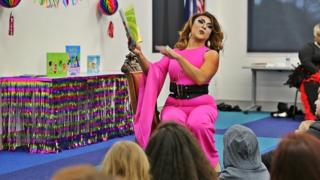 Image caption Princess Mocha reading 'Oh, The Places You'll Go' by Dr Seuss to children in Greenville, South Carolina
Image caption Princess Mocha reading 'Oh, The Places You'll Go' by Dr Seuss to children in Greenville, South Carolina
Drag queen story hours - events where drag performers read to children - are moving out of the big cities and coming to conservative southern US states.
A group of drag queens stand in a small room at the back of a public library in South Carolina, their bright outfits in contrast with the beige walls.
Children file in and quickly scan the larger-than-life characters before turning their attention to running around and playing.
"There are five drag queens walking around this room and not one kid has walked up to us and said 'you're so weird'," says drag queen Rylee Hunty. "Kids exist in their own fantasy world and we fit into that."
The children assemble on the floor in front of Rylee as she starts to read. After a page or so, she is interrupted by a young girl who stands up and offers Rylee her bracelet because she's "a princess".
Outside the library, armed police watch over groups of protesters and counter-protesters chanting at each other in the rain. Each side representing a different view of the future of the American South.
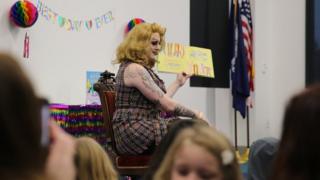 Image caption Rylee Hunty helped organise the story time event
Image caption Rylee Hunty helped organise the story time event
Drag Queen Story Hour was established in San Francisco in 2015, and has since spread across the US and around the world.
While the Greenville story hour is not officially linked to the organisation, it is part of a growing movement to bring these events to Middle America.
Jonathan Hamilt, a board member of Drag Queen Story Hour in New York, told the BBC they have seen "an exponential growth in the number of events in more conservative, rural and southern states over the last year".
"We have chapters in Nebraska, Indiana and Alabama. I think it is partly a reaction to the political landscape of the US right now and a need for more queer programming for children."
Mr Hamilt says events in rural areas "definitely see more protests".
"When you leave big liberal areas, people tend to be more conservative. Their fear can come out as anger."
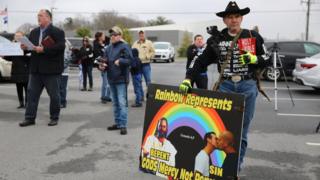 Image caption A group of protesters came to voice their opposition to the story-telling event
Image caption A group of protesters came to voice their opposition to the story-telling event
Rylee says she is keen to show the children at the event that diversity exists in Greenville.
"I knew from a young age I was different. If I had this when I was younger, maybe I would have had a happier high school experience rather than being confused and sad and having anxiety," Rylee reflects.
"I felt like a bad person. You're in the South - [people think] if you're gay or different you're going to hell."
This sentiment is shared by Princess Mocha, another drag queen reading at the event.
She strides up and down in front of the children in a fuchsia jumpsuit and towering high heels, canvassing opinion on whether giraffes or elephants are the group's preferred animal.
The children's eyes follow her back and forth as she reads.
"You'll move mountains, kid", Princess Mocha reads from her chosen book, before pausing and turning to the crowd. "You really will," she adds.
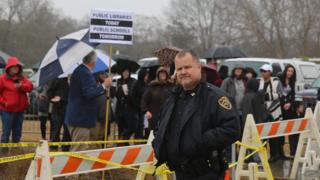 Image caption Police shut roads and restricted access to the library during the event
Image caption Police shut roads and restricted access to the library during the event
On the day of the event, the roads around the library are closed, and security is tight after threats of violence were made against those attending the story hour.
Amanda Osborne, one of the event organisers, told the BBC that "veiled or direct threats to attendees and the drag queens has been the scariest part".
"There has been an armed guard posted in our local library every day for the last week. That's where we are in our community right now."
The opposition to the story hour was spearheaded by the Facebook groups "GOP Politics of South Carolina" and "Greenville Tea Party" who organised a "pro-family community gathering" to coincide with the event.
"I just disagree with targeting children," says protester Jan standing outside the library. "They are actively promoting sin and wrongdoing and they are doing this to children.
"What they do in their own home or at some nightclub amongst consenting adults - have at it. But don't involve children."
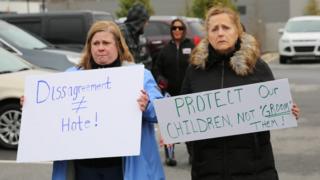 Image caption Protesters at the Drag Queen Story Hour event accused the organisers of "indoctrinating" children
Image caption Protesters at the Drag Queen Story Hour event accused the organisers of "indoctrinating" children
The library, being a public institution, is bound by the First Amendment of the US Constitution which enshrines the right to free speech in law.
In a statement, library officials told local media that "meeting spaces are available on an equitable basis, regardless of the beliefs or affiliations of the individuals or groups requesting their use".
Jan says that she thinks "that's a cop-out".
"There should be a set of community standards for decency," Jan says. "If a group doesn't follow that, then they cannot hold their meetings in the library."
Jan links the event to a wider trend she perceives in the US.
"I don't see why their rights should trump ours. It always seems in society today that's what happens. They want to be considered the victim, they want to have special rights."
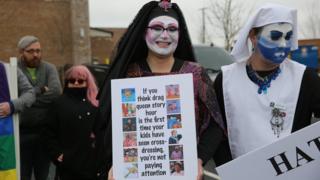 Image caption Many counter-protesters came to support the event
Image caption Many counter-protesters came to support the event
In response to the controversy surrounding the event, many counter-protesters assembled at the library.
Natalie Shaik, one of the event organisers, told the BBC it was a "big deal" that so many people in Greenville came to support them.
Despite, or perhaps because of the controversy, the event is well attended and additional readings are laid on for the queue of children waiting.

Wayne Wiegan, professor of library sciences at Florida State University
The tradition of story hours in America began in the late 1800s in Hartford, Connecticut. Caroline Hewins created a read-aloud programme and by the end of the 19th Century the events were commonplace across the country.
Public librarians have done a good job of convincing the public that they are neutral, but through history they have had an inconsistent response to First Amendment issues.
In the early 20th Century, socialists and communists were often allowed to meet in libraries, for example. By the time the Cold War started, that was no longer the case.
During the Civil Rights movement there were open protests by black families against "Little Black Sambo" being read at story hours. The book was accused of being racist and many libraries took it off their shelves.
The passage of time has a tendency to change local moral horizons.

Amanda Garrett has lived in the South her entire life.
"It bothers me so much when people try to claim that they know what southern morals are, or that they own the values of our community.
"That gets me at a very personal level."
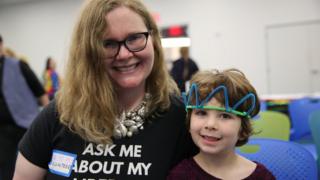 Image caption Amanda Garrett brought her seven-year-old son Alex to the event
Image caption Amanda Garrett brought her seven-year-old son Alex to the event
Ms Garrett's son Alex spent the afternoon listening to the drag queens reading and making a crown with pipe cleaners.
"The drag queens are dressing up, having a great time and confident about who they are," Ms Garret says. "That's something Alex can be too if he wants."
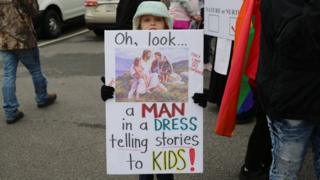
Christia Spears Brown is a professor of psychology at the University of Kentucky who studies gender development in children.
She told the BBC that while these events can seem "silly and frivolous" they could lead to "positive outcomes for young children if they feel able to express themselves".
"Conversely we know that there are negative outcomes for children who feel pressure to conform," Ms Brown said. "Those children are not as psychologically stable."
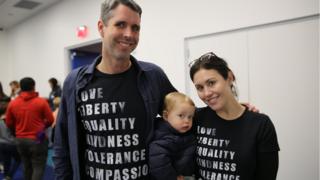 Image caption Elizabeth and David Truby took their 20-month-old son William to the event to "show up for people who are marginalised"
Image caption Elizabeth and David Truby took their 20-month-old son William to the event to "show up for people who are marginalised"
Ms Brown told the BBC: "Culture can support, or not, a child's gender identity but it can't create it.
"To be clear, you can't make kids gay or transgender. Think of it this way - the vast majority of LGBTQ people saw predominantly cisgender and straight role models growing up.
"The frequency with which traditional gender stereotypes are reinforced - every time a child uses a gendered bathroom or is called a good boy or girl - far outnumber the instances that gender is questioned, for example being read to by a drag queen."
All photos copyright as shown.
‘We Gotta Stop This’: Pro-Trump One America News Fights ‘Socialist’ College Courses
Because we watch Trumpland TV so you don’t have to, today we learned that the Young America’s Foundation has released its annual “Dirty Dozen” list, featuring the 12 most “appalling” college courses it claims are fostering “intellectual abuse and flat-out indoctrination.”
YAF’s Spencer Brown joined One America News host Liz Wheeler to discuss the “pipeline for indoctrinating the next generation of socialist voters,” but they seem to have struggled to find much of substance to be offended by:
There's a class called Immigration to the United States: Beyond Walls. At Northwestern University we have Beyond the Binary: Transgender and Race, at Williams College we have Racial Capitalism...it's like they've targeted all the progressive talking points and in college said "Okay, how can turn normal, rational teenagers, 18-year-olds into our crazy socialists. These classes are how they do it.
The course that topped YAF’s list is offered at Illinois, and is titled “Gender in Gaming,” a topic that has been discussed so long the idea it ought to be debated is now anodyne.
“American Misogyny” at Middlebury College also pops up, and we can’t possibly imagine why that might be relevant today.
“Cuba from Emancipation to Revolution” at Georgia is literally a history class; I took a similar one in college, though it was about Canadian history, and it didn't seem to upset anybody.
And Princeton’s “Marx in the 21st Century” seems a pretty apt offering, considering that it is the 21st century and a substantial percentage of the world’s population lives in countries ostensibly governed by Marxist principles.
40 years ago, I fled South America for freedom. I am one of the lucky ones
When my 17-month-old son and I landed in the US early on February 20, 1979, my American passport garnered me a “Welcome Home, Mrs. Sage” from the smiling U.S. Customs officer. I had just become a wanted criminal in Brazil for taking my child out of the country without my husband’s permission, an illegal act at the time, but here I was a welcome American citizen. As I look back today, 40 years later, I realize that not much has changed for those who seek to flee their countries, just as I had.
As a result of today’s vibrant and all-encompassing social media movements like #MeToo, many South American women are making the choice to flee from abusive husbands. Brutal dictatorships, extreme poverty, rampant crime, and unforgivingly corrupt governments are also driving them from their homes. Venezuela’s economy is in complete freefall, El Salvador’s murder rate is the highest in the world, Hondurans fear the escalating crime rate and gangs in their country will continue to rise, and every day women are brutally raped and abused at the hands of strangers and family at an alarming rate. Due to rampant corruption at all government levels, there is nowhere to turn for protection and help. There is often no choice but to flee and hope for a better life in a new country. I understand their desperate need to escape. I felt those same fears.
As young newlyweds in Brazil, my husband, the wealthy grandson of a New York State Senator, and I had been taken from our bed in the middle of the night by Brazilian police, accused of “dealing drugs.” No charges were ever filed against us because it was all a lie. Yet, we were kept in a dungeon prison, beaten, raped and brutally tortured daily for 45 days. We were released when my family paid a $400,000.00 bribe. It was nothing more than a kidnapping for ransom perpetrated by corrupt police. Yes, there’s no doubt I’d been damaged. But in 1979 there was no support, there were no “trauma counselors.” I was told simply, to “buck up” and “get on with my life.”
Following our kidnapping, our marriage quickly disintegrated as we both struggled to face our trauma, but divorce was illegal and living as a separated woman in Sao Paulo in 1979 was the equivalent of having a scarlet letter tattooed on my cheek. I lived in perpetual fear, almost unable to function during the day, as a result of the nightmares I faced every night. I needed to get away. I needed to find a brighter future for myself and for my son, one that included freedom. As I looked into my sons shining bright blue eyes, contemplating our escape, I couldn’t help but fear what else was “out there” for us? What could I find? Could it possibly be a better life? I had to try to find out. I knew I couldn’t give my son a safe and happy life on my own in my home country.
Early in 1979 I began secreting away every spare cent I could, selling some of my precious belongings and economizing household spending however I could to save a little more. By the time I was ready to leave I had a few thousand dollars in cash and a semi-plan. Unlike the women who are traveling today across thousands of miles by foot through dangerous and unknown lands, I was completely bilingual and fully familiar with the U.S. because I had traveled here yearly my whole life as an upper-class dual citizen. I had one-way first-class plane tickets and valid passports for my son and I. But in 1979 not many dared to do what I was planning. If I got stopped, I would be forcibly returned and would become an outcast because it was illegal for a woman to leave the country without her husband’s consent in Brazil. My son would be taken from me, and I knew I could face imprisonment, or worse.
Too quickly it was February 19, 1979. That was the day before my passport would expire, and if I wanted another one, I would need my husband’s permission. I knew that would never happen. So, on that day I became a single mother, a fugitive, and a refugee. This wasn’t something I’d ever thought I would be. I realized what I would be leaving behind in exchange for my freedom: my birth home, my parents, my brother, my extended family and my lifelong friends. I’d be leaving behind an 8,000-square-foot home filled with servants, beautiful furnishings, priceless works of art and antiques. I’d be leaving behind my club memberships, my horses, my beach house, my leisurely lifestyle. And, I’d be leaving behind my husband, the man I was still in love with despite the wide chasm that had opened between us in the few brief years we’d been married. I wondered if I was crazy. There were certainly enough people who would say I was unbalanced or fragile, right?
Why would I want to leave my life of luxury in Brazil? As a child of privilege, I’d lived through a dictatorship and a nasty revolution. I’d seen people dragged away, heard stories of kidnappings and brutal murders all my life. I’d seen threatening armed soldiers in the streets, lived under a curfew imposed by the government. My father was always armed. We had well-trained dogs and watchmen patrolling our property, which had seven-foot walls that were topped with spiked glass shards. I’d always felt safe yet still somehow, jittery. All those precautions were considered normal in Brazil, but there was also a veil of darkness and uncertainty that cloaked the joy and ease of our wealth. This was the shadow side of privilege in a country where many were and today still are destitute.
I believed I deserved a better, safer life. Despite my upper-class status, my fears were not much different from those of women fleeing today. I feared being ripped out of my bed in the dead of night by corrupt police, then left to be tortured in a dungeon prison, while starving and freezing, simply because they had the power to do so.
Like today’s refugees, I was also willing and able to do whatever I had to do to make it on my own. I would work at whatever job was necessary in order to support myself and my son. I was certain I could get a great job with my education and upbringing, but I didn’t. Instead, I waited tables and cleaned bathrooms, working nights for tips so that my son and I could spend our days together. I also never dreamed that I’d have to live in a low-income housing complex, surrounded by poverty and drug dealing activity, but in the beginning, that was all I could afford. I never dreamed that I might not be accepted in the U.S., that I would be labeled “different”.
And yet by all standards, I was the lucky one.
Many of today’s refugees and immigrants come fully expectant to do whatever necessary to make just enough money to survive. They feel exhilarated at having gotten away. They are fueled by the prospect of freedom. And yet they are often humiliated, heckled or accused of being criminals, and often turned away. They are thrown into “holding facilities” — just another word for prison. Still, most do not complain and are often still willing to do whatever they have to do in order to be granted entry into “the land of opportunity.”
It is true that many have not come here legally, but it is important to understand that, in their countries, that word, “legal” can be meaningless. In the corrupt state that is their country, their desire to leave may be a crime. So, too, their desire to live in peace. Their attempts to seek peace or flee their countries might even be punishable by death, torture and imprisonment. Their desire to work for a living wage may not be possibility. Women are raped, children sold into slave labor, men are beaten if they do not agree with their boss’s politics, they are “disappeared” if they dare to speak out. There is no protection for their rights. They live in poverty unlike any we know here in the U.S. — no running water, no electricity, no food, no healthcare. To them, anything is better than that.
Today, 40 years later, when I see media images of the faces of women and children who are struggling to come to the United States, I know that they are like me. And I know that nothing has changed in their countries in the 40 years since I left. They were hopeless in their native countries, and like me, they are willing to do anything to find freedom. Also like me, they have no idea what to expect. But unlike me, most of them are not bilingual nor do they have dual citizenship or valid documentation. Unlike me, most of them are not fair-skinned and blue-eyed, making them easily identifiable as “different” to those who want to condemn and hate them. I am humbled by their journey.
No comments:
Post a Comment